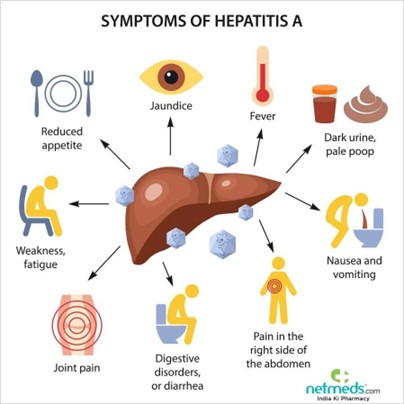A nurse is collecting data from a client who has hepatitis A. Which of the following findings should the nurse expect?
Splenomegaly
Abdominal pain
Irregular heart rate
Tarry stools
The Correct Answer is B
A nurse collecting data from a client who has hepatitis A should expect to find that the client may have abdominal pain. Hepatitis A is a liver infection that can cause inflammation and discomfort in the abdomen.
The other options are not typical symptoms of hepatitis
a) Splenomegaly is an enlargement of the spleen and is not a typical symptom of hepatitis A.
c) An irregular heart rate is not a typical symptom of hepatitis A.
d) Tarry stools may indicate bleeding in the digestive tract and is not a typical symptom of hepatitis A.

Nursing Test Bank
Naxlex Comprehensive Predictor Exams
Related Questions
Correct Answer is D
Explanation
Answer: D
Rationale:
A) "Wash your newborn's head under a stream of running water": Washing the newborn's head under a stream of running water is not safe due to the risk of startling the baby or causing discomfort. Instead, the head should be gently washed using a damp cloth or sponge.
B) "Bathe your newborn within 30 minutes after a feeding": Bathing a newborn within 30 minutes after feeding is not advisable as it may cause discomfort or spitting up due to the baby's full stomach. It is better to wait for some time after feeding before bathing the baby.
C) "Start the bath by washing the newborn's diaper area first": Starting the bath by washing the newborn's diaper area first is not recommended. The face and head should be washed first to avoid spreading bacteria from the diaper area to other parts of the body.
D) "The bath water should be 100 to 103 degrees Fahrenheit": This is the correct temperature range for a newborn's bath water. It is essential to ensure that the water is warm enough to be comfortable but not too hot, to avoid burns or discomfort. The temperature should be checked with a thermometer or the elbow to ensure it is safe for the baby.
Correct Answer is A
Explanation
The nurse should include the instruction to "verify the identity of anyone who wants to remove your baby from the room" in the teaching about security procedures. It is important for parents to be vigilant and ensure that only authorized personnel have access to their baby.
Option b is incorrect because it may not be safe for the parent to leave their baby unattended in their room while they walk in the hallway.
Option c is incorrect because newborns typically have two identification bands, one on their arm and one on their leg.
Option d is incorrect because parents should not leave the unit with their baby without proper authorization and discharge procedures.
Whether you are a student looking to ace your exams or a practicing nurse seeking to enhance your expertise , our nursing education contents will empower you with the confidence and competence to make a difference in the lives of patients and become a respected leader in the healthcare field.
Visit Naxlex, invest in your future and unlock endless possibilities with our unparalleled nursing education contents today
Report Wrong Answer on the Current Question
Do you disagree with the answer? If yes, what is your expected answer? Explain.
Kindly be descriptive with the issue you are facing.
